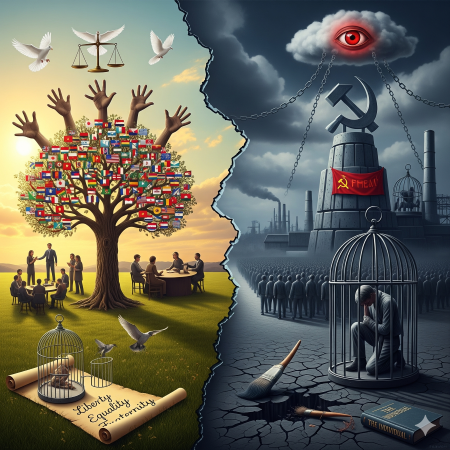What historical examples show communism descending into dictatorship or cults of personality?

Throughout history, several communist states have transitioned from a revolutionary ideology to authoritarian dictatorships led by a single figure.
These leaders often developed a cult of personality to solidify their power and demand absolute loyalty, bypassing traditional party structures.
The Soviet Union under Joseph Stalin
After Vladimir Lenin's death, Joseph Stalin consolidated power by outmaneuvering his rivals. He transformed the Soviet Union into a totalitarian state through purges, political repression, and a meticulously crafted cult of personality.
-
Rewriting History: Stalin's propaganda machine rewrote history to exaggerate his role in the 1917 Bolshevik Revolution, portraying himself as Lenin's loyal successor and a hero of the working class.
-
The "Father of the Peoples": State-controlled media, art, and literature depicted Stalin as an omniscient and benevolent leader—the "Father of the Peoples." His image was omnipresent in schools, factories, and public squares, and he was praised in songs, poems, and films.
-
The Great Purge: To eliminate all opposition and maintain total control, Stalin initiated the Great Purge in the 1930s. Millions of perceived rivals, intellectuals, and military officers were arrested, executed, or sent to labor camps (Gulags). This climate of fear ensured that no one could challenge his authority.
China under Mao Zedong
Mao Zedong's rule in China is another prime example of communism devolving into dictatorship. His cult of personality became a defining feature of the People's Republic of China, particularly during the Cultural Revolution.
-
The Little Red Book: To mobilize the masses and attack his political opponents, Mao distributed the "Little Red Book," a collection of his quotes. Memorizing and quoting from it became a sign of loyalty, turning his writings into a near-religious text.
-
Red Guards: Mao used the Red Guards, a paramilitary youth movement, to purge the Chinese Communist Party of officials he saw as a threat. This violent movement attacked those deemed "counter-revolutionaries" and enforced strict adherence to Maoist ideology.
-
Worship and Symbolism: Mao's image was elevated to an almost godlike status. He was seen as the "Great Helmsman," the infallible leader guiding China to a glorious future. Public art, parades, and rituals reinforced this image, making his personality central to the state's identity.
North Korea under the Kim Dynasty
North Korea represents the most extreme case, where a communist state has become a hereditary dictatorship with a pervasive and absolute cult of personality that spans three generations of the Kim family.
-
Hereditary Rule: Unlike other communist states, North Korea is a hereditary monarchy disguised as a communist republic. Power is passed from father to son (Kim Il Sung to Kim Jong Il, then to Kim Jong Un), a practice that is antithetical to the principles of communism.
-
"Eternal President": The state's official ideology, Juche, is a mix of Marxism-Leninism and a fervent nationalism centered on the Kim family. Kim Il Sung remains the "Eternal President" even after his death, and his descendants are worshipped as demigods.
-
Systemic Control: The government controls every aspect of citizens' lives, from what they can wear to what they can say. Dissent is nonexistent, as criticism of the Kim family is a crime punishable by imprisonment, torture, or death. Propaganda glorifies the leaders and instills a deep-seated belief that the Kims are the saviors of the Korean people.
- Questions and Answers
- Opinion
- Motivational and Inspiring Story
- Technology
- Live and Let live
- Focus
- Geopolitics
- Military-Arms/Equipment
- الحماية
- Economy
- Beasts of Nations
- Machine Tools-The “Mother Industry”
- Art
- Causes
- Crafts
- Dance
- Drinks
- Film/Movie
- Fitness
- Food
- الألعاب
- Gardening
- Health
- الرئيسية
- Literature
- Music
- Networking
- أخرى
- Party
- Religion
- Shopping
- Sports
- Theater
- Health and Wellness
- News
- Culture

